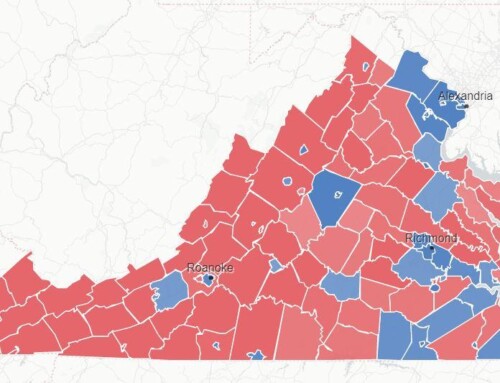When the Governor took office he was faced with the challenge of balancing the budget while facing a 2.2 billion dollar shortfall, with a projected 4 billion dollar deficit over the next two years. To this end, the Governor recommended a decrease in funding to education, a recommendation that has drawn recent criticism. However, these cuts are not only necessary but reasonable.
A closer examination of education shows that funding has significantly out-paced enrollment. Over the past decade funding to K-12 education has increased by 58.9%; if you include federal stimulus funding, the total funding increased by 68.7%. In this same period, student enrollment only increased by 7.2%. Furthermore, even after the proposed cuts to education, funding for 2010 is still 51.9% higher than it was in FY 2000.
Many Virginians support these proposed cuts and believe that with proper prioritization, appropriate cuts can be made without impacting the core goals of the school systems.
“In these tough economic times Virginia families are cutting budgets and prioritizing expenses. We expect our elected officials to do the same and make tough decisions that will improve the financial outlook for our state. We need the Governor to lead on this critical issue,” stated Angie Parker of Just Liberty.
During a recession we have to re-evaluate what constitutes necessity and what is a nice to have. There is consensus that funding should be focused in the classroom. One primary focus area should be administrative costs. Currently 100% of lottery proceeds go towards education, but 39% of this money is appropriated for administrative costs. The Superintendent of Chesterfield schools receives $234,130 in total compensation and has five assistant superintendents making over $140,000 in total compensation. This is a general trend in school districts throughout the state. To put this into perspective, the Governor’s salary is $175,000.
“The school administrators are threatening to cut jobs in the classroom in response to budget cuts. Parents concerned about their child’s education should begin to ask tough questions of their local school administrators and demand that they keep cuts out of the classroom. Another area that we could focus on is the perceived need for massive and elaborate school buildings and laptop computers for every child. These “nice to have’s” seem less relevant to providing quality education for our students when we are forced to make cuts and prioritize expenses,” said Michelle Stanley of Richmond Patriots, who is a mom with children in the public schools.
We applaud the Governor for making the difficult but necessary decision to reduce the growth rate of funding for education. Now it is up to the localities to insure that the schools make the right decisions about how to implement those cuts while having the least impact on the classroom.
###






I am heartened that a Tea Party group actually has the testicular fortitude to actively endorse issues, politicians, and candidates (as you have done with your “Lumps” report). I wish we had more of you up here in Maryland.
The Governor also proposed to make state employees take five furlough days a year for the next two years to help balance the budget. Although I do not represent any state agency, I have been a state employee for 19 years and make less than $40,000 a year. There are thousands of state employees earning a lot less. I guess I should have become a school administrator so my salary cut would at least be controversial. Instead, I’ll take a pay cut so the General Assembly doesn’t have too. Does our “conservative” Governor propose cutiing salaries for the General Assembly or cutting funding for pre-trial services? How about these free cell phone commercials for Virginia residents? Who is paying for that?
The citizens put the current administration in to bring a spending problem under control. As a citizen, a retired one at that, I enjoy a lot less than before. Bottom line everyone including the government will have to do with less. When times are tight and people are laid off and hurting badly I think the government can give a little. After all the last figures I hear is only 3% of government employees are laid off with nearly 10% in the private sector.
“Elaborate school buildings”? I wish. In Fairfax County, one of the wealthiest counties in the nation, every public school has a fleet of trailers – and more are needed – to accommodate the growing student population. Schools are over crowded. Yet the governor is cutting, cutting, cutting. I’d be in favor of paying more taxes to support public schools, but with the Party of No in charge, I guess soon the education budget will be small enough to drown it in a bathtub. Why do conservatives want to destroy the public school system?
Why do liberals want to keep throwing money at the public school system when it isn’t getting the job done?Nations that spend a fraction of what we do on schools are kicking our butts academically because our “system” is a joke. It has nothing to do with pencils, paper and buildings and everything to do with a lopsided top down unionized approach to teaching.
Come on, let’s be honest about our numbers at the very least: Over the last decade, at 3% per year, inflation has risen more than 30%. Your number of 60-70% is now 30-40%. Next, what do you include in the “funding for education” category? Are capital projects included? If so, your numbers are heavily skewed. Let’s have some accountability in our tea party.
A recent survey has shown that the majority of tea-baggers are 45+. I think it’s safe to assume that they have already educated THEIR children. And they did it while they educated them on everyone else’s tax dollars. I have never begrudged paying my own salary while working with your kids…
I guess that’s what makes me a crazy “liberal”… speaking of liberal, I’ll bet you want your kids to go to a school with a “liberal” admissions policy…and pursue a “liberal” arts degree… next time you dine out, you’ll probably want a “liberal” portion…
Seriously? What administrator is going to say “Hey, I’m overpaid. I think I’ll cut my salary by 50% rather than laying off a couple of teachers”. When you throw these cuts out there, without guidance of how they should be used, the people least able to fight will be the ones that suffer. You want to reduce costs to the government, start by actually understanding how the money is spent, rather than just assuming. I’ll wager any line level State employee could point out more REAL cost reducing measures. I can tell you from experience that we try, but we’re rarely heard.